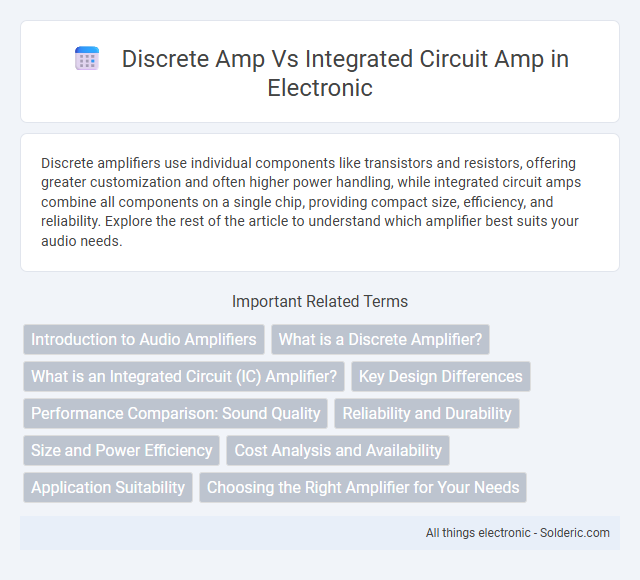Discrete amplifiers use individual components like transistors and resistors, offering greater customization and often higher power handling, while integrated circuit amps combine all components on a single chip, providing compact size, efficiency, and reliability. Explore the rest of the article to understand which amplifier best suits your audio needs.
Comparison Table
| Feature | Discrete Amplifier | Integrated Circuit Amplifier |
|---|---|---|
| Component Type | Individual transistors, resistors, capacitors | All components on a single IC chip |
| Size | Larger, bulky | Compact, small footprint |
| Performance | High customization, potentially higher power | Consistent performance, limited customization |
| Cost | Higher production cost due to discrete parts | Lower cost in mass production |
| Heat Dissipation | Better heat management with separate components | Limited heat dissipation, more prone to overheating |
| Complexity | More complex wiring and assembly | Simple integration and easier manufacturing |
| Repair & Maintenance | Easier to diagnose and replace individual parts | Difficult to repair, often replaced as a whole |
| Application | High-end audio, custom designs | Consumer electronics, general purpose |
Introduction to Audio Amplifiers
Audio amplifiers are essential in enhancing sound signals for clear and powerful output in various audio devices. Discrete amplifiers use individual transistors or components, providing superior customization, thermal management, and audio quality, making them ideal for high-fidelity audio systems. Integrated circuit amplifiers combine all components into a single chip, offering compact design, cost efficiency, and ease of mass production, suitable for consumer electronics and portable devices.
What is a Discrete Amplifier?
A discrete amplifier uses individual semiconductor components such as transistors, resistors, and capacitors assembled on a circuit board to amplify signals, offering greater design flexibility and easier customization for specific audio or RF applications. Unlike integrated circuit amplifiers, which combine all components into a single microchip, discrete amplifiers allow engineers to select high-quality parts for improved performance, thermal management, and reliability. This approach enables precise control over amplification characteristics, making discrete amps favored in high-end audio and specialized industrial equipment.
What is an Integrated Circuit (IC) Amplifier?
An Integrated Circuit (IC) amplifier is a compact electronic device where multiple amplifier components, such as transistors and resistors, are fabricated onto a single semiconductor chip. This integration enhances signal amplification efficiency, reduces physical size, and improves reliability compared to discrete amplifiers that use separate components. IC amplifiers are widely used in audio systems, communication devices, and signal processing due to their consistent performance and ease of mass production.
Key Design Differences
Discrete amps use individual components like transistors, resistors, and capacitors, offering greater customization and flexibility in circuit design. Integrated circuit (IC) amps combine multiple functions into a single chip, resulting in compact size, consistent performance, and easier mass production. Your choice depends on whether you prioritize design flexibility or space efficiency and manufacturing simplicity.
Performance Comparison: Sound Quality
Discrete amplifiers typically offer superior sound quality due to their individual components allowing for precise tuning and lower distortion levels, resulting in cleaner and more accurate audio output. Integrated circuit (IC) amplifiers, while more compact and cost-effective, often face limitations in sound fidelity due to fixed circuits and potential susceptibility to noise. Audiophiles frequently prefer discrete amps for their higher dynamic range and better harmonic response, enhancing transparency and detail in music reproduction.
Reliability and Durability
Discrete amplifiers typically offer higher reliability and durability due to their modular design, allowing for easier repair and replacement of individual components compared to integrated circuit amps. Integrated circuit amplifiers, while compact and cost-effective, may suffer from reduced longevity since a single failure can affect the entire chip, making repairs challenging. Choosing a discrete amp can enhance the lifespan and robustness of Your audio system, especially in demanding environments.
Size and Power Efficiency
Discrete amplifiers typically consume more power and occupy larger physical space due to individual components like transistors and resistors mounted separately, impacting size and power efficiency. Integrated circuit amplifiers leverage miniaturized semiconductor fabrication, resulting in significantly smaller footprints and enhanced power efficiency through optimized internal layouts. Your choice between discrete and integrated circuit amps should consider the trade-off between compact design and potential power handling requirements.
Cost Analysis and Availability
Discrete amps generally offer higher customization but come with increased cost due to individual components and assembly complexity, impacting your budget significantly. Integrated circuit amps are more cost-effective and readily available, benefiting from mass production and simplified design, making them accessible for most applications. The availability of integrated amps often surpasses discrete models, which may require special ordering or longer wait times.
Application Suitability
Discrete amplifiers excel in high-power and high-frequency applications due to their superior thermal management and customization flexibility, making them ideal for professional audio equipment and RF transmitters. Integrated circuit amplifiers offer compactness, cost-effectiveness, and ease of integration, which suits consumer electronics and portable devices requiring low power consumption. Understanding your application's power, size, and performance requirements helps determine the most suitable amplifier type for optimal functionality.
Choosing the Right Amplifier for Your Needs
Discrete amplifiers offer superior customization and higher power output, making them ideal for audiophiles and professional sound systems seeking precise sound quality and robust performance. Integrated circuit amplifiers provide compact, cost-effective solutions with lower power consumption, suitable for everyday electronics and portable devices where size and efficiency are priorities. Selecting between discrete and integrated amplifiers depends on specific requirements such as audio fidelity, power demands, space constraints, and budget considerations.
Discrete amp vs Integrated circuit amp Infographic

 solderic.com
solderic.com